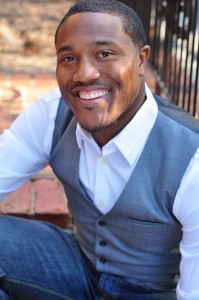Motivational speaker Stan Pearson doesn’t just use a microphone to get a crowd on its feet. He gets them grooving to a beat using salsa dancing in his presentations. Pearson uses comedy, his real-life experiences and interactive activities to talk about how to revamp any student’s skills as a leader.

Accent Editor Kelsey Fowler spoke to Pearson about hitting his groove with a crowd and being a strong leader.
Kelsey Fowler: What is your goal as a motivational speaker? How do you make yourself stand out?
Stan Pearson: You have to be able to be well-received because there are a lot of people out there to bring messages. But I just want to make sure mine is delivered in an interesting way, so that anyone can receive it regardless of their race, age, gender or socioeconomic background. … At the end of the day everyone will receive something different.
KF: How did you get started?
SP: I attended a lot of leadership conferences and long story short, one day as I was leaving the room someone said, ‘We have this leadership academy going on, would you like to do it?’ And I said sure. It felt good; it felt natural. I wanted to find a way to do this forever — that was my feeling. It was the start of my journey to help others.
KF: What do you do to win over a crowd?
SP: With any great relationship, you want to establish rapport, a sincere rapport. Whenever I can get on campus or to a business early, I do so I can meet and greet with people in the community. … If people go crazy and clap for me without earning that relationship, it doesn’t work. With any good relationship you have to earn trust. You’re accountable for it once you get in front of others, to inspire and motive them to some degree. I make sure things from the very beginning are interactive. A lot of my programs are active-learning programs, which means — like the program I’m doing at Ithaca — people are able to take more away from it because they are doing an activity during the learning process.
KF: How do you feel about addressing college audiences?
SP: The world is shifting, and honestly, college people are making changes in the world. When it comes to presentations for college kids, if it’s not good, they’ll tell you they didn’t get it. I appreciate that so much. College students can really connect. It means that much more coming from an honest place.
KF: You speak about how to become a strong leader. Do you ever learn anything from your audience?
SP: All day, every day. Sometimes people underestimate their abilities, underestimate who they are, don’t think they are made for greatness — made for that dream. But, being conscious of what they have to contribute to a group — I learn from that. People keep going in a very cavalier way, but with strength and confidence people can make it, absolutely. Every time I present, I come away with a ‘Wow.’ No matter what country or part of the world, people are coping, and they stay the course in dealing with different problems.
KF: Do you actually require people to salsa dance?
SP: I typically have never given the option. I’ve done this program for 10 people and for 400 people, such a wide range, and I know the experience is what people make it. With salsa dance, that’s what’s going to happen. I had a program once with people with physically disabilities, people in wheelchairs, doing it to the full extent of what they could. If it’s a matter of attitude, if they’re too cool, that’s a different story. It’s not just salsa, it’s a transformation in people with the program going on. People notice when they see that happen. If I see people doing it to the fullest of their ability, I’m OK with that. I highly encourage them to participate — not just because it’s salsa, but because of the transformation that is happening in people.
KF: What is the most important thing you try to tell people in your leadership training?
SP: Number one: that they’re better than they think they are. And ultimately, whatever you’re going to pursue, you need five key things: Support, the ability to Act, Learning — if you’re not learning you’re not living — Striving and Accepting. That’s S.A.L.S.A. If I want you to take one thing away, that’s the goal. That’s what you should walk away with. I hold my audience accountable.
If You Go
SAB presents: Stan Pearson
When: 8 p.m. Friday
Where: Emerson Suites
How much: Free




